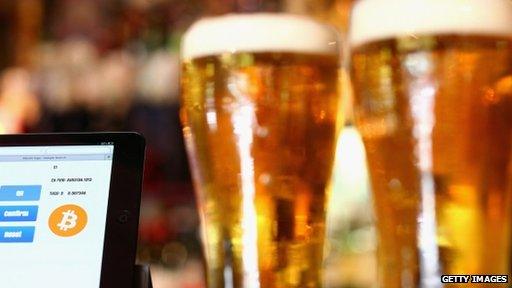China bans banks from handling Bitcoin trade
- Published

Bitcoins are starting to be accepted for some real-world goods and services
China has banned its banks from handling transactions involving the Bitcoin virtual currency.
The ban came in a notice issued, external by the People's Bank of China, financial watchdogs and the nation's IT ministry.
Bitcoins were a "virtual good", had no legal status and should not be used as a currency, it said.
The decision comes after bitcoins' rapid rise in value was called a "bubble" by Alan Greenspan, former US Federal Reserve chairman.
The ban was imposed because bitcoins were not backed by any nation or central authority, said the notice.
It added that it was planning to step up its efforts to curb the use of bitcoins to launder cash.
Individuals were still free to trade in bitcoins but should be aware of the risks involved, said the People's Bank of China (PBOC), adding that it planned to formalise the regulation of exchanges that dealt in the digital cash.
Experts told Reuters the PBOC was moved to make its decision because Chinese nationals were heavily involved in trading the virtual currency. Many believe this is because it helps them avoid controls on trade in the yuan.
Value soar
The value of bitcoins traded on Chinese exchanges fell after the announcement was made.
Interest in the virtual currency has seen its value soar in recent weeks.
On 28 November, the value of one bitcoin surpassed $1,000 for the first time.
The swift rise in value led Mr Greenspan to say the exchange rate for the virtual currency was "unsustainably high" in an interview with Bloomberg.
"It's a bubble", he said, going on to question the financial value people had pinned on bitcoins.
"You have to really stretch your imagination to infer what the intrinsic value of Bitcoin is," he said. "I haven't been able to do it. Maybe somebody else can."
- Published4 December 2013
- Published28 November 2013
- Published27 November 2013
- Published5 November 2013